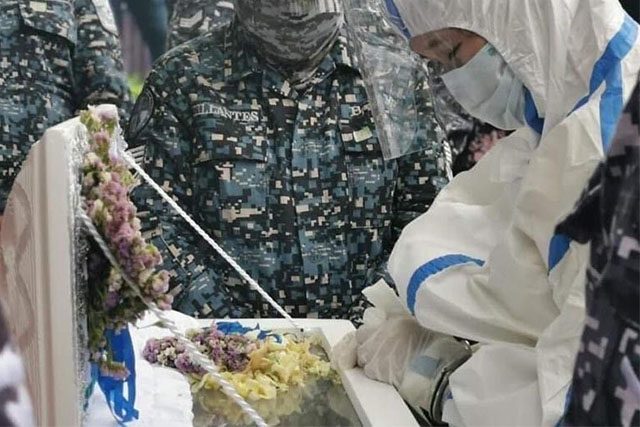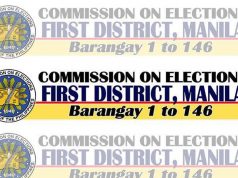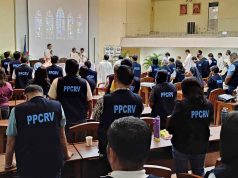
Filipinos are calling on their fellow citizens to register as voters as condemnation against the circumstances surrounding Baby River Nasino‘s funeral grow while the government loosens its stay-at-home restrictions on Friday.
Twitter influencers Mark Geronimo and AC Soriano joined the calls for the youth to register while they express their anger towards the events that unfolded following the last day of the three-month-old baby’s wake.
Geronimo, who was among the petitioners challenging the controversial Anti-Terrorist Act of 2020, asked his followers who are not yet registered voters to do so in response to the tension between the police, family members and supporters in Baby River’s wake and the succeeding funeral.
“Please register. Magparehistro na kayo. Nagmamakaawa ako. Sobra-sobrang g*guhan na ‘to. Patalsikin ang mga pasistang hayop. #PulisAngTerorista #MagparehistroKa,” he tweeted.
Soriano also urged his followers to do the same after seeing a news item that reported on the government allowing people ages 15 to 65 years old to go out, unlike before wherein only authorized persons outside residence (APOR) can do so.
“Oh ayan, magparehistro na kayo! Magalit kayo sa mga nababasa ninyo sa timeline ninyo at bumoto nang tama! Nang nararapat!” he wrote in response to the news item.
Other Twitter users also encouraged their fellow citizens to use the opportunity to register and exercise their right to suffrage in the next elections.
“Kung legal ka na, magparehistro ka na, mababago natin ‘tong p*t*nginang sistema ‘to! Hindi tayo susuko #JusticeForBabyRiver #FreeReinaMaeNasino #FreePoliticalPrisoners #OustDuterteNOW
#OustDuterte,” a Filipino said.
Another online user retweeted Geronimo’s post that featured jailed activist Reina Mae Nasino, River’s mother, in full personal protective equipment suit as she grieved for her child.
“Magparehistro kayo. Bumoto. Nakakasuka na ‘tong gobyerno na ‘to,” he wrote with a vomiting face emoji.
Magparehistro kayo. Bumoto. Nakakasuka na 'tong gobyerno na 'to 🤮 https://t.co/akpIB9oSPv
— Kenneth 💡 (@KennethDugayLPT) October 16, 2020
“To all of my Filipino moots who are in legal age already and haven’t yet registered to vote, please do so. T*ngina na nang kahayupan na nangyayari sa bansa natin kaya please, magparehistro kayo. I am using this account to speak up and to remind all of you,” another Twitter user said.
On Friday, Baby River was laid to rest at the Manila North Cemetery after she lost her life on October 9 because of acute respiratory distress syndrome.
Nasino previously applied for furlough to be with her daughter during her last days but the latter had passed away before the court could give its decision.
RELATED: Furlough ruling juxtaposed: The case of Baby River activist mom vs Bong Revilla and father
Meanwhile, groups decried the events leading to Baby River’s funeral, from the number of police deployed in the funeral home to the shortened period she was granted to see and mourn her child.
The last day of the baby’s wake was similarly filled with tension as reports of state forces “hijacking” the funeral procession of Baby River, which is supposed to be an extremely solemn event, surfaced just a few hours after she was laid to rest.
Nasino remained handcuffed during the internment.
Voter registration
Voter registration is currently ongoing until September 30, 2021.
Comelec offices are open from Tuesdays to Saturdays from 8 a.m. to 3 p.m. to accommodate eligible Filipinos.
Individuals who are 18 years old and above can register by downloading the forms on Comelec’s website while guidelines are available on the social media pages of We the Youth Vote, a non-partisan community.
Last month, Comelec spokesperson James Jimenez invited Filipinos to tweet “#IWillVoteIn2022” after a proposal to cancel the upcoming national elections due to the coronavirus pandemic surfaced.
Eased restrictions
The government on Friday announced that individuals from 15 to 65 years old can now leave their houses, easing the stay-at-home guidelines wherein 18 to 60 years old individuals were only allowed to go out.
Local government units (LGUs), however, may impose a higher age limit for minors, depending on the severity of the COVID-19 situation in their respective jurisdictions.
Traveling between areas of general community quarantine to areas of modified general community quarantine is also allowed in a bid to boost the pandemic-battered economy, but these are subject to reasonable regulations imposed by the LGUs concerned.
People who are allowed to travel include those that are not considered authorized persons outside of residence.
The government has also allowed non-essential outbound travel for Filipinos beginning October 21, provided they have travel and health insurance, as well as confirmed roundtrip tickets and a negative antigen test results for COVID-19.









